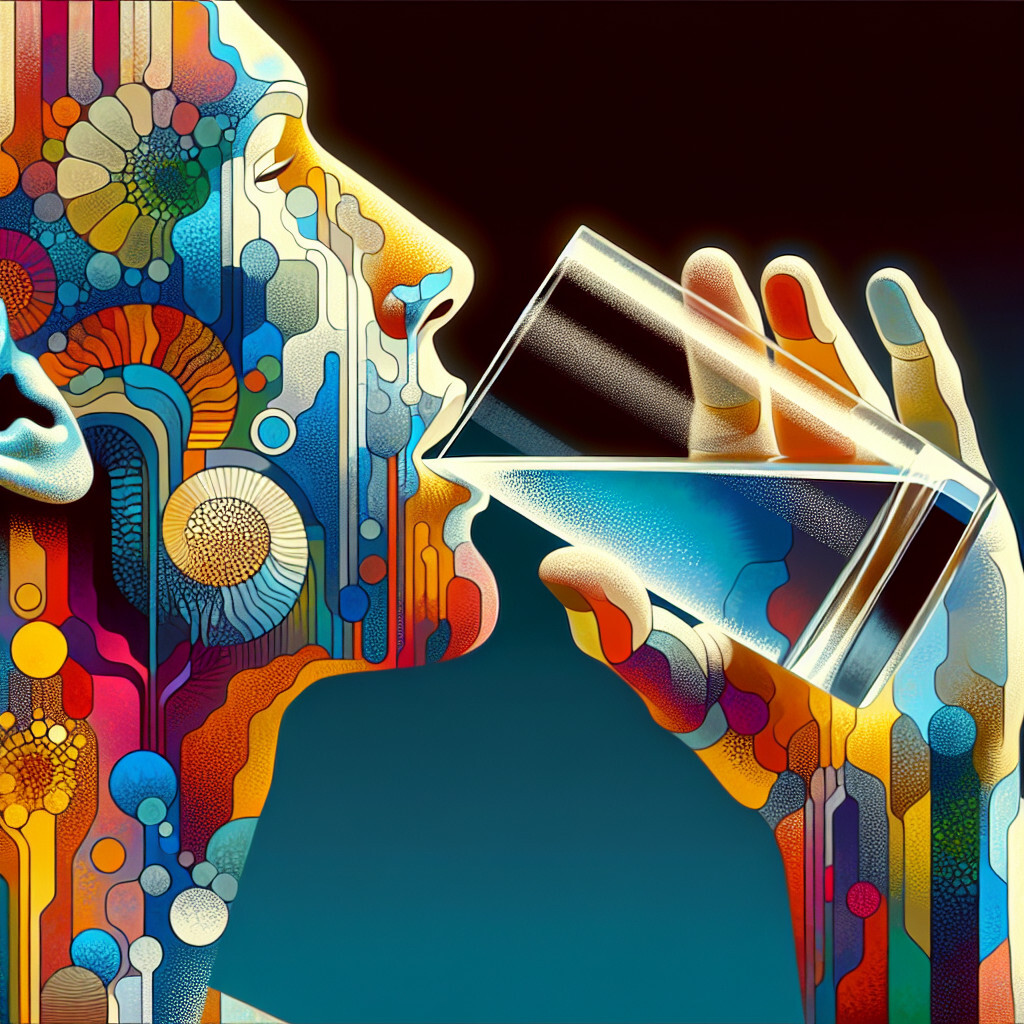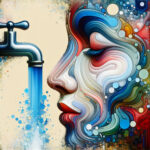-
Table of Contents
“Tap Water: Unseen Effects on Your Skin’s Health and Glow.”
Introduction

Drinking tap water can potentially affect your skin due to the various minerals and chemicals that it contains. The quality and composition of tap water can vary greatly depending on the location and source, which can include elements like chlorine, heavy metals, and hard water minerals. These substances can impact the skin’s health and appearance, potentially leading to issues such as dryness, inflammation, and premature aging. However, the effects of tap water on skin are not entirely negative, as certain minerals found in it can also contribute to maintaining skin hydration and health.
The Impact of Tap Water on Skin Health
The impact of tap water on skin health is a topic that has been gaining increasing attention in recent years. As we become more conscious of the substances we expose our bodies to, the quality of the water we drink and use for personal hygiene has come under scrutiny. The question arises: can drinking tap water affect your skin? The answer is not straightforward, as it depends on various factors, including the quality of your local tap water and your skin’s sensitivity.
Tap water, in many parts of the world, is treated with a variety of chemicals to kill bacteria and other microorganisms. One of the most common of these chemicals is chlorine. While chlorine is effective in making water safe to drink, it can also have a drying effect on the skin. This is particularly true for individuals with sensitive skin or conditions like eczema or psoriasis. The drying effect can lead to itchiness, redness, and flaking.
Moreover, tap water often contains hard minerals like calcium and magnesium. These minerals can build up on the skin, clogging pores and causing breakouts. They can also leave a residue on the skin that can make it feel rough and dry. This is why some people find that their skin feels smoother and looks more radiant when they wash with soft water.
In addition to these external effects, drinking tap water can also have an internal impact on your skin. If your tap water contains high levels of certain contaminants, it could potentially lead to skin problems. For instance, research has suggested a link between exposure to high levels of heavy metals in drinking water and skin conditions like dermatitis and eczema.
However, it’s important to note that the impact of tap water on skin health can vary greatly depending on the quality of your local water supply. In many developed countries, tap water is heavily regulated and generally safe to drink. But even in these cases, it may still contain substances that could potentially irritate your skin or contribute to skin conditions.
If you’re concerned about the impact of tap water on your skin, there are several steps you can take. First, consider getting your water tested. This can give you a better idea of what substances are in your water and whether they could be affecting your skin. If your water is hard or contains high levels of chlorine, you might consider installing a water softener or a shower filter. These can help to reduce the levels of these substances in your water.
Drinking plenty of water is essential for skin health, as it helps to keep your skin hydrated and flush out toxins. But if you’re concerned about the quality of your tap water, you might consider drinking filtered or bottled water instead.
In conclusion, while tap water can potentially affect your skin, the extent of this impact depends on various factors, including the quality of your local water supply and your skin’s sensitivity. If you’re concerned about the impact of tap water on your skin, consider getting your water tested and taking steps to improve its quality if necessary. Remember, maintaining a healthy lifestyle, including a balanced diet and adequate hydration, is the most effective way to promote good skin health.
Understanding the Connection between Tap Water and Acne
The relationship between the quality of water we consume and the health of our skin is a topic that has been gaining increasing attention in recent years. More specifically, the question of whether drinking tap water can affect your skin, particularly in relation to acne, has become a subject of interest for many. This article aims to shed light on this intriguing connection, providing an informative and formal exploration of the topic.
Tap water, as we know, is treated with a variety of chemicals to ensure its safety for consumption. Among these chemicals, chlorine is one of the most commonly used disinfectants. While it is effective in killing harmful bacteria and viruses, it can also strip the skin of its natural oils when consumed in large amounts, leading to dryness and irritation. This, in turn, can trigger the overproduction of oil, a condition that can clog pores and lead to acne breakouts.
Another factor to consider is the hardness or softness of tap water. Hard water contains high levels of minerals such as calcium and magnesium. While these minerals are not harmful to ingest, they can form a film on the skin when washing, preventing the natural oils from being released. This can cause the skin to become dry and irritated, again leading to an overproduction of oil and potential acne breakouts. On the other hand, soft water, which has lower mineral content, is less likely to cause such issues.
Furthermore, the pH level of tap water can also play a role in skin health. Our skin has a slightly acidic pH, which helps to maintain its barrier function and prevent bacterial growth. However, most tap water has a neutral to slightly alkaline pH. Regular exposure to such water can disrupt the skin’s pH balance, potentially leading to increased sensitivity, dryness, and acne.
It’s important to note that while these factors can potentially contribute to skin issues, they are not the sole cause of acne. Acne is a complex condition that can be influenced by a variety of factors, including genetics, hormones, diet, and stress. Therefore, while improving the quality of your drinking and washing water can potentially help improve your skin health, it should not be seen as a standalone solution for acne.
There are several ways to mitigate the potential effects of tap water on your skin. Using a water filter can help to remove excess chlorine and other chemicals. If you live in a hard water area, consider installing a water softener or using a shower filter. Additionally, using skincare products that help to restore the skin’s pH balance can also be beneficial.
In conclusion, while the connection between tap water and acne is not fully understood, there is evidence to suggest that the quality of the water we consume and use for washing can have an impact on our skin health. However, it’s important to remember that acne is a multifactorial condition, and improving water quality should be seen as just one part of a comprehensive skincare routine. As always, if you’re struggling with persistent acne, it’s best to consult with a dermatologist or a skincare professional for personalized advice.
How Hard Water from Your Tap Can Affect Your Skin
Water is a fundamental element of our daily lives, not only for hydration but also for our hygiene routines. However, the quality of the water we use can significantly impact our health and, more specifically, our skin. One of the most common concerns is the effect of hard tap water on the skin. Hard water is a term that refers to water with a high mineral content, primarily calcium and magnesium. While these minerals are not harmful to ingest, they can have a profound impact on the skin’s health and appearance.
Hard water can be problematic for the skin due to its high mineral content. When you wash your skin with hard water, these minerals can form a film on the skin, leading to dryness and potential irritation. This is because the mineral deposits left behind by hard water can disrupt the skin’s natural barrier, preventing it from retaining moisture effectively. Over time, this can lead to chronic dryness, flaking, and even exacerbation of conditions like eczema and psoriasis.
Moreover, hard water can also affect the efficacy of your skincare products. The minerals in hard water can react with the ingredients in soaps, cleansers, and other skincare products, reducing their effectiveness. This means that you may not be getting the full benefits of your skincare routine if you’re washing your face or bathing with hard water. In some cases, this reaction can also create soap scum, a residue that can clog pores and lead to breakouts.
Another concern is that hard water can be harsh on the skin, stripping it of its natural oils. This can disrupt the skin’s pH balance, making it more susceptible to bacterial growth and inflammation. This imbalance can lead to a variety of skin issues, including acne, redness, and sensitivity.
Furthermore, hard water can also contribute to premature aging. The mineral deposits left on the skin can cause it to feel rough and can accentuate the appearance of fine lines and wrinkles. Over time, this can lead to a dull, aged appearance.
However, it’s important to note that not everyone will experience these effects. The impact of hard water on the skin can vary depending on several factors, including your skin type, the specific mineral content of your water, and the duration of your exposure to hard water.
If you suspect that hard water is affecting your skin, there are several steps you can take. First, consider getting a water softening system for your home. These systems work by removing the excess minerals from your water, making it softer and gentler on your skin. Alternatively, you can use a shower filter, which can help to reduce the mineral content of your water.
In addition, adjusting your skincare routine can also help to mitigate the effects of hard water. Look for products that are specifically designed for hard water, as these can help to neutralize the minerals and prevent them from depositing on your skin. Also, consider using a moisturizer regularly to help replenish the moisture lost due to hard water.
In conclusion, while hard tap water is not harmful to your health, it can have a significant impact on your skin. By understanding the potential effects and taking steps to mitigate them, you can help to protect your skin and maintain its health and appearance.
The Role of Tap Water in Skin Aging and Dryness
The role of tap water in skin aging and dryness is a topic that has been gaining attention in recent years. As we strive to maintain youthful, radiant skin, it is essential to consider all potential factors that could contribute to skin aging and dryness, including the water we drink daily. This article will delve into the question: can drinking tap water affect your skin?
Tap water, which is readily available in most households, is often taken for granted. However, it is important to note that the quality of tap water can vary significantly from one location to another. This variation is due to the different types and levels of minerals and chemicals present in the water, which are influenced by factors such as the source of the water and the treatment processes it undergoes.
One of the primary concerns with tap water is its hardness, which refers to the high concentration of minerals such as calcium and magnesium. While these minerals are not harmful to ingest, they can have a drying effect on the skin. When hard water comes into contact with the skin, it can disrupt the skin’s natural barrier, leading to dryness and irritation. Over time, this can accelerate the aging process, resulting in wrinkles and fine lines.
Furthermore, tap water often contains chlorine, a chemical used to kill bacteria and other microorganisms. While chlorine is effective in ensuring the water is safe to drink, it can also strip the skin of its natural oils, leading to dryness and inflammation. This can exacerbate skin conditions such as eczema and psoriasis and contribute to premature aging.
In addition to hardness and chlorine content, tap water may also contain other chemicals and pollutants that can negatively impact the skin. For instance, heavy metals like lead and copper, which can be present in older plumbing systems, can cause oxidative stress in the skin cells. This can lead to inflammation, collagen breakdown, and ultimately, skin aging.
However, it is important to note that the impact of tap water on skin health is a complex issue, and other factors such as genetics, diet, and skincare routine also play significant roles. Moreover, while the potential effects of tap water on the skin can sound alarming, there are ways to mitigate these risks.
One of the simplest solutions is to install a water filter that can remove excess minerals and harmful chemicals from tap water. Using a moisturizer after washing can also help to replenish the skin’s natural oils and maintain its moisture barrier. Additionally, drinking plenty of water, whether it’s from the tap or a filtered source, is crucial for maintaining hydrated, healthy skin.
In conclusion, while tap water can potentially contribute to skin aging and dryness, it is just one piece of the puzzle. A holistic approach to skincare, which includes a balanced diet, regular exercise, adequate sleep, and a good skincare routine, is key to maintaining youthful, radiant skin. Nevertheless, being aware of the potential impact of tap water on the skin can help us make informed decisions about our water consumption and skincare practices.
Q&A
1. Question: Can drinking tap water affect your skin?
Answer: Yes, drinking tap water can affect your skin. The quality and contents of the tap water, such as chlorine and hard minerals, can potentially cause skin dryness and irritation.
2. Question: How does tap water cause skin dryness?
Answer: Tap water often contains hard minerals like calcium and magnesium. When consumed in large amounts, these can dehydrate the skin, leading to dryness.
3. Question: Can tap water cause skin breakouts?
Answer: Yes, if the tap water contains high levels of certain minerals and impurities, it can lead to skin breakouts or exacerbate existing skin conditions like acne.
4. Question: Is it safe to wash my face with tap water?
Answer: Generally, it is safe to wash your face with tap water. However, if the water is hard or contains high levels of chlorine, it may cause skin dryness and irritation. Using a water softener or a filter can help reduce these effects.
Conclusion
Drinking tap water can potentially affect your skin, both positively and negatively. On the positive side, staying well-hydrated by drinking water can help keep your skin moisturized and healthy. On the negative side, if the tap water contains high levels of certain contaminants or hard minerals, it could potentially cause or exacerbate skin problems.






